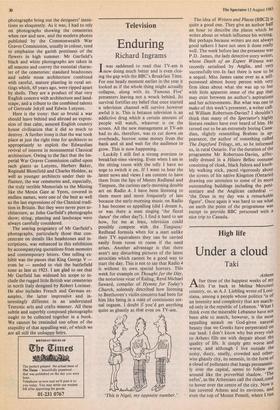Television
Enduring
Richard Ingrams
T was saddened to read that TV-am is 'now doing much better and is even clos- ing the gap with the BBC's Breakfast Time. For one heady moment earlier in the year it looked as if the whole thing might actually collapse, along with its 'Famous Five' presenters leaving not a wrack behind. Its survival fortifies my belief that once started a television channel will survive however awful it is. This is because television is an addictive drug which a certain amount of people will watch, whatever is on the screen. All the new management at TV-am had to do, therefore, was to cut down on overheads, borrow some money from the bank and sit and wait for the audience to grow. This is now happening.
Luckily I still feel a strong aversion to breakfast-time viewing. Even when I am in the sitting room with the telly 1 have no urge to switch it on. If I want to hear the latest news and views I am content to have them from the lips of Messrs Redhead and Timpson, the curious early-morning double act on Radio 4. I have been listening to them more and more frequently of late because the early-morning music on Radio 3 has become so appalling (did I dream it, or was there a man singing 'the floral dance' the other day?). I find it hard to see how, for me at least, television could possibly compete with the Timpson/ Redhead formula when for a start unlike their TV equivalents they can be carried easily from room to room if the need arises. Another advantage is that there aren't any disturbing pictures of the latest atrocities which cannot be a good way to start the day. This is not to say that Radio 4 is without its own special horrors. This week for example on Thought for the Day, the notorious vicar of Ealing, Revd Michael Saward, compiler of Hymns for Today's Church, solemnly described how listening to Beethoven's violin concerto had been for him like being in a state of continuous sex- ual orgasm. I doubt if you'd get anything quite as ghastly as that even on TV-am.
'This is Nigel, my opposite number.'
The idea of Writers and Places (BBC2) is quite a good one. They give an author half an hour to describe the places which he writes about or which influence his writing. But perhaps because writers are not always good talkers I have not seen it done really well. The week before last the presenter was P.D. James, the lady detective story writer, whose Death of an Expert Witness was recently serialised by Anglia, and very successfully too. In fact there is now to be a sequel. Miss James came over as a self- possessed almost bossy person with very firm ideas about what she was up to but with little apparent sense of the gap that may exist between an author's aspirations and her achievements. But what was one to make of this week's presenter, a writer call- ed William Robertson-Davies? I shouldn't think that many of the Spectator's highly literate readers have ever heard of him. He turned out to be an extremely boring Cana- dian, slightly resembling Brahms in ap- pearance, the author of something called The Deptford Trilogy, set, so he informed us, in rural Ontario. For the duration of the programme Mr Robertson-Davies, affec- tedly dressed in a Hilaire Belloc costume consisting of cloak, black fedora and knob- bly walking stick, paced vigorously about the streets of his native Kingston (Ontario) drawing our attention to some of its more outstanding buildings including the peni- tentiary and the Anglican cathedral 'the Dean in my day was a remarkable figure'. Once again it was hard to see what on earth the point of the programme was except to provide BBC personnel with a nice trip to Canada.






































 Previous page
Previous page